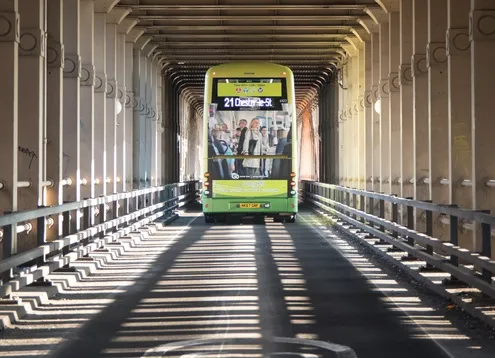On show for the first time at Traffex 2013 is Siemens’ Stratos, which the company says demonstrates the future of traffic management. Developed using the latest cloud-based technology, Stratos delivers scalable real-time traffic management, information and control; from basic monitoring to strategic control of complex urban traffic environments. According to Mark Bodger, product manager, Stratos is the latest generation of traffic management, information and control systems from Siemens and the most effect
April 17, 2013
Read time: 2 mins
On show for the first time at 136 Traffex 2013 is 189 Siemens’ Stratos, which the company says demonstrates the future of traffic management. Developed using the latest cloud-based technology, Stratos delivers scalable real-time traffic management, information and control; from basic monitoring to strategic control of complex urban traffic environments.
According to Mark Bodger, product manager, Stratos is the latest generation of traffic management, information and control systems from Siemens and the most
effective solution available today. ‘Building on the company’s long heritage of traffic control, Stratos integrates the latest developments in information technology deployments and introduces complete flexibility in implementation of the most effective traffic management. Increased redundancy, flexible deployment models and access anywhere are just some of the benefits which Stratos brings to traffic managers in addressing the complex needs of maximising network efficiency whilst minimising operational costs’, he said.
With a range of different application modules, including journey time information, strategic network management, car park management and driver information, Stratos brings the latest technology to traffic management infrastructure, with flexible deployment options to address individual customer requirements.
Mark Bodger added: ‘Stratos can be deployed using cloud infrastructure to provide a completely scalable solution, including full redundancy and standby options for complete peace of mind and continuous operation. Furthermore, mobile applications allow system monitoring to be easily implemented and shared with stakeholders for maximum engagement.”
According to Mark Bodger, product manager, Stratos is the latest generation of traffic management, information and control systems from Siemens and the most
effective solution available today. ‘Building on the company’s long heritage of traffic control, Stratos integrates the latest developments in information technology deployments and introduces complete flexibility in implementation of the most effective traffic management. Increased redundancy, flexible deployment models and access anywhere are just some of the benefits which Stratos brings to traffic managers in addressing the complex needs of maximising network efficiency whilst minimising operational costs’, he said.
With a range of different application modules, including journey time information, strategic network management, car park management and driver information, Stratos brings the latest technology to traffic management infrastructure, with flexible deployment options to address individual customer requirements.
Mark Bodger added: ‘Stratos can be deployed using cloud infrastructure to provide a completely scalable solution, including full redundancy and standby options for complete peace of mind and continuous operation. Furthermore, mobile applications allow system monitoring to be easily implemented and shared with stakeholders for maximum engagement.”









